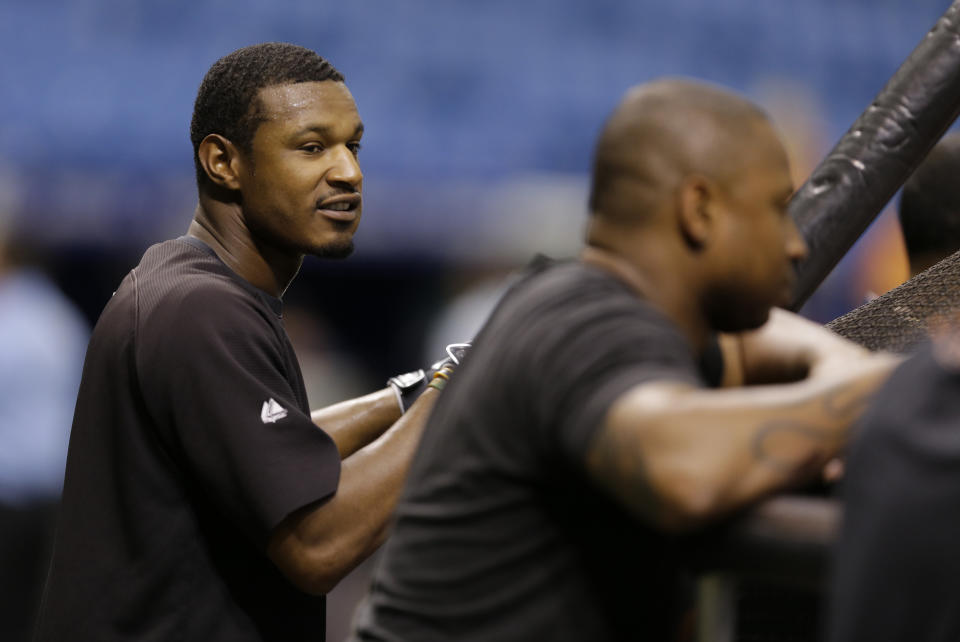Adam Jones sees obstacles to more blacks playing Major League Baseball

CHICAGO — All-Star Adam Jones of the Baltimore Orioles took notice Saturday when mostly white Wrigley Field erupted in cheers for all-black Jackie Robinson West winning the United States championship at the Little League World Series. Jones said he was happy for the kids from the South Side of Chicago, but he wasn't all that impressed with the remote cheering section.
"I see people cheering and all of that stuff here in the stadium, but they’re not going down there and supporting Jackie Robinson West," Jones told Big League Stew. "They’re just doing it because they’re on TV. They see 'Chicago' on TV. I want to see more people be a part of it, rather than just say, ‘Oh, they’re from Chicago? Let’s just cheer because they’re from our hometown.’ Be a part of it.
"But I’m happy for those kids who are going out there and they’re grinding. I’m happy to see that."
Jackie Robinson West fell to South Korea in the international championship Sunday afternoon, but their surge at the Little League World Series, along with that of the racially mixed Taney Dragons of Philadelphia featuring Mo'ne Davis, again brought to light a question about Major League Baseball: Why aren't more African Americans playing it? In 1981, a high of 18.7 percent were black. This season, it's 8.3 percent. Baseball is the sport of Jackie Robinson, an irreplaceable character in the history of civil rights in the U.S. Why do blacks seem to be getting squeezed out, 67 years later?
It's not lost on Jones, who is among the 8.3 percent of African Americans, that MLB also pays lip service to black players. Overall, the league has never been healthier, with revenues topping perhaps $9 billion this season, commissioner Bud Selig has said. Development in foreign countries continues to grow, and while some of those players have black skin, it's not the same as showing interest in players like Jones, who's from San Diego.
"I have my own theories as to why as to why those numbers have dwindled," Jones said. "I’m pretty sure the owners wouldn’t like my comments."
At home, MLB has put at least $30 million into programs such as R.B.I. — Reviving Baseball in the Inner Cities — that helps to build new fields and spruce up old ones, and to put on tournaments for boys and girls from 5 to 18. One of Adam Jones's teammates, Manny Machado, played in the R.B.I. program. But getting kids to play baseball at a young age — like the Jackie Robinson players, who are 12 or 13 — isn't necesarily the issue.
"There’s tons of African American kids playing baseball," Jones said. "But once they start getting to 14, 15, 16 years old, the high school age, they have to deal with the pressures of playing multiple sports. The individual coaches want them to play just one sport. They might be good in all three sports, but their coaches nowadays want them to be in one sport because they want to win — for their own job security."
CC Sabathia of the New York Yankees noted in a New York Times article that college baseball scholarships aren't as numerous as those for college football, leaving athletes good at both sports with an easy decision for college: They go where the scholarship is.
Two groups have the power, if they summon the will, to do something about the vanishing black player. One is the MLB's 30 owners. The number of players from Latin America has gone from 12 percent in 1984 to 28.4 percent this season because the league invests in places like the Dominican Republic. Comparatively, the inner cities are ignored, though it says it's aware. Detroit Tigers president Dave Dombrowski also heads a diversity task force looking into what the league can do to reverse the trend. Jones is skeptical of the excuses.
"They’re billionaires," Jones said of the owners. "When’s the last time you saw a billionaire not get to do what he wants to do?"
Another power broker is the dwindling amount of black players. A group including B.J. and Justin Upton, LaTroy Hawkins, Torii Hunter and Carl Crawford pitched in to send several Jackie Robinson West parents to Williamsport for the Series. A terrific gesture. But in addition to financial support, Jones said, black players can continue to show their faces in the community.
"Sometimes it’s not necessarily about giving money," Jones said. "It’s time. A lot of my friends who are African Americans in baseball, they’ve given money to their respective leagues, wherever they came through. But they’ve also shown face, going down there and interacted with the kids, hit B.P. with them, ran around with them. Smiled and laughed with them. Showed them that we’re humans. We’re not just going to write a check. You need to put in the time, physically.
"The kids get to reap the benefits of a new park. But if you go there and talk to them, they can see that you come from the same area, have the same kind of upbringing, and you’ve found a way to make your life meaningful. These kids will see that people are looking out for them."
More MLB coverage at Yahoo Sports:
- - - - - - -
David Brown is an editor for Big League Stew on Yahoo Sports. Have a tip? Email him at rdbrown@yahoo-inc.com and follow him on Twitter!

 Yahoo Sports
Yahoo Sports 
